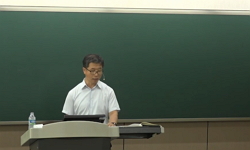This article discusses possible legal improvement on the criminal liability of corporate officers. The currently ongoing hotly debated legal issues on punishing corporate officers regarding death or injury of the workers in a variety of industrial sit...
http://chineseinput.net/에서 pinyin(병음)방식으로 중국어를 변환할 수 있습니다.
변환된 중국어를 복사하여 사용하시면 됩니다.
- 中文 을 입력하시려면 zhongwen을 입력하시고 space를누르시면됩니다.
- 北京 을 입력하시려면 beijing을 입력하시고 space를 누르시면 됩니다.

미국의 법인 종사자의 형사처벌에 관한 비교법적 연구 - 경영자 형사책임 원칙을 중심으로 - = A Comparative Legal Study on the Criminal Liability of Corporate Employee - Focused on the Responsible Corporate Officer Doctrine -
한글로보기부가정보
다국어 초록 (Multilingual Abstract)
This paper reviews ‘the Responsible Corporate Officer Doctrine(hereinafter RCOD), the American theory which supports punishing corporate officers based on strict vicarious liability. The representative two cases of the Supreme Court of the United States show that the corporate officers with no mens rea are criminally liable for the offences committed by the corporate employee even when the employee are not identified or not punished. Although the rationale of RCOD is not clear whether corporate officers are responsible for their own negligence as a supervisor or respondeat superior, the Supreme Court clarifies that corporate officers taking their own risk of violating criminal codes are responsible for the offences occurring in corporate business when they are in a better position to prevent the offences than the public and when no defense of factual impossibility is applied. Although the strict vicarious liability is not persuasive to the Korean criminal principles, it gives some implication to us when we currently emphasize the social and criminal responsibility of the corporate officers.
This article discusses possible legal improvement on the criminal liability of corporate officers. The currently ongoing hotly debated legal issues on punishing corporate officers regarding death or injury of the workers in a variety of industrial sites such as a construction site, are mostly focused on whether they are responsible and if so, what mens rea is required. Based on the continental system, however, the Korean criminal law does not recognize the strict liability which is criticized as violating the culpability principle.
This paper reviews ‘the Responsible Corporate Officer Doctrine(hereinafter RCOD), the American theory which supports punishing corporate officers based on strict vicarious liability. The representative two cases of the Supreme Court of the United States show that the corporate officers with no mens rea are criminally liable for the offences committed by the corporate employee even when the employee are not identified or not punished. Although the rationale of RCOD is not clear whether corporate officers are responsible for their own negligence as a supervisor or respondeat superior, the Supreme Court clarifies that corporate officers taking their own risk of violating criminal codes are responsible for the offences occurring in corporate business when they are in a better position to prevent the offences than the public and when no defense of factual impossibility is applied. Although the strict vicarious liability is not persuasive to the Korean criminal principles, it gives some implication to us when we currently emphasize the social and criminal responsibility of the corporate officers.
국문 초록 (Abstract)
미국에서 법인의 형사처벌은 종업원의 위반행위에 대한 대위책임으로서 동일시이론을 따르지만 위반행위를 한 종업원이 반드시 처벌받을 것을 전제로 하지 않을 뿐만 아니라, 집합적 인식이론에 의해 종업원의 위반행위와 별도로 법인을 처벌할 수 있다는 점, 공범을 정범으로 처벌함으로써 실제 행위를 한 종업원이나 경영책임자의 처벌이 필요하지 않다는 점은 동일시이론의 단점을 보완할 수 있는 것으로서 법인의 독자적인 범죄능력을 인정하기 위한 요건으로 도입을 고려할 필요가 있다.
미국의 경영자 형사책임 원칙은 공공의 안전과 보건에 중요한 사항에 있어서 예방효과를 극대화하기 위해 법인 이외에 경영자에 대하여 엄격책임 법리를 적용하고 있다. 경영책임자의 고의 또는 과실을 입증하기 쉽지 않다는 점에서 경영책임자에게 위험책임을 부담하며, 그 형식은 종업원의 위반행위에 대한 대위책임의 법리를 따르고 있다. 다만, 종업원의 위반행위에 대한 특정이나 처벌을 조건으로 하지 않기 때문에 그 처벌이 종업원보다는 경영자에게 집중된다. 이는 공공의 이익 보호가 중요한 특정 범죄에 대하여 종업원 책임에서 법인과 경영책임자가 책임을 지는 관점으로 변화되는 것을 의미한다. 미국처럼 경영책임자에게 엄격책임을 묻기는 어렵지만 위험방지 의무를 강화하여 과실범으로 처벌하는 방식을 고민할 필요가 있다. 다만 삼벌 규정과 같이 종업원의 위반행위에 대한 경영책임자의 관리⋅감독 책임을 근거로 할 것인지 아니면 위반행위를 방지하기 위한 경영책임자의 순수한 과실 책임을 근거로 할 것인지는 추가적인 논의가 필요하다.
우리나라에서는 법인의 범죄능력을 인정함으로써 일반범죄에 있어서 법인 처벌을 긍정해야 한다는 논의와 함께 경영책임자의 처벌을 통한 기업의 사회적 책임을 강조하는 논의가 최근 강...
우리나라에서는 법인의 범죄능력을 인정함으로써 일반범죄에 있어서 법인 처벌을 긍정해야 한다는 논의와 함께 경영책임자의 처벌을 통한 기업의 사회적 책임을 강조하는 논의가 최근 강력하게 대두되고 있다. 최근 산업안전보건법이나 중대재해처벌법이 경영책임자의 형사처벌을 강조하는 것도 이러한 문제의식에 터 잡은 것이라고 할 수 있다. 그렇지만 기업의 분업화된 의사결정 및 관리시스템 속에서 경영책임자의 고의 또는 과실을 검사가 입증하기는 현실적으로 쉽지 않다. 더욱이 구체적인 의사결정자나 행위자의 처벌을 전제로 하는 우리 양벌규정으로는 이러한 위반행위를 억제하는데 한계가 있는 것이 사실이다. 이 논문은 이러한 문제의식 하에 미국 법인의 형사책임과 경영자 형사책임원칙을 검토 한 후 다음과 같은 결론을 도출할 수 있었다.
미국에서 법인의 형사처벌은 종업원의 위반행위에 대한 대위책임으로서 동일시이론을 따르지만 위반행위를 한 종업원이 반드시 처벌받을 것을 전제로 하지 않을 뿐만 아니라, 집합적 인식이론에 의해 종업원의 위반행위와 별도로 법인을 처벌할 수 있다는 점, 공범을 정범으로 처벌함으로써 실제 행위를 한 종업원이나 경영책임자의 처벌이 필요하지 않다는 점은 동일시이론의 단점을 보완할 수 있는 것으로서 법인의 독자적인 범죄능력을 인정하기 위한 요건으로 도입을 고려할 필요가 있다.
미국의 경영자 형사책임 원칙은 공공의 안전과 보건에 중요한 사항에 있어서 예방효과를 극대화하기 위해 법인 이외에 경영자에 대하여 엄격책임 법리를 적용하고 있다. 경영책임자의 고의 또는 과실을 입증하기 쉽지 않다는 점에서 경영책임자에게 위험책임을 부담하며, 그 형식은 종업원의 위반행위에 대한 대위책임의 법리를 따르고 있다. 다만, 종업원의 위반행위에 대한 특정이나 처벌을 조건으로 하지 않기 때문에 그 처벌이 종업원보다는 경영자에게 집중된다. 이는 공공의 이익 보호가 중요한 특정 범죄에 대하여 종업원 책임에서 법인과 경영책임자가 책임을 지는 관점으로 변화되는 것을 의미한다. 미국처럼 경영책임자에게 엄격책임을 묻기는 어렵지만 위험방지 의무를 강화하여 과실범으로 처벌하는 방식을 고민할 필요가 있다. 다만 삼벌 규정과 같이 종업원의 위반행위에 대한 경영책임자의 관리⋅감독 책임을 근거로 할 것인지 아니면 위반행위를 방지하기 위한 경영책임자의 순수한 과실 책임을 근거로 할 것인지는 추가적인 논의가 필요하다.
참고문헌 (Reference)
1 김성천, "책임주의 원칙과 법인의 형사책임" 중앙법학회 18 (18): 73-94, 2016
2 권오성, "중대재해처벌법의 해석상 쟁점 - 제6조와 제7조를 중심으로 -" 노동법이론실무학회 (35) : 191-229, 2022
3 송지용, "중대재해 처벌 등에 관한 법률의 위헌성 검토" 대검찰청 (74) : 231-267, 2022
4 김성돈, "기업처벌을 위한 형벌법규의 형법전 편입방안" 한국형사법학회 32 (32): 3-45, 2020
5 김성룡 ; 권창국, "기업 ・법인의 형사책임법제 도입가능성과 필요성" 대검찰청 (46) : 113-181, 2015
6 김재윤, "기업 경영진의 형사책임에 관한 연구- 산업안전보건법상 양벌규정의 문제점과 개정안을 중심으로 -" 한국법제연구원 (40) : 395-425, 2011
7 Katrice Bridges Copeland, "the Crime of Being in Charge: Executive Culpability and Collateral Consequences" 2014
8 Sasha Ivanov, "When the Punishment Does not Fit the Crime: Exclusions from Federal Health Care Programs Following Convictions under the Responsible Corporate Officer Doctrine" 2016
9 Joshua Dressler, "Understanding Criminal Law" 2018
10 James D. Cox, "Treatise on the Law of Corporations" Westlaw 2021
1 김성천, "책임주의 원칙과 법인의 형사책임" 중앙법학회 18 (18): 73-94, 2016
2 권오성, "중대재해처벌법의 해석상 쟁점 - 제6조와 제7조를 중심으로 -" 노동법이론실무학회 (35) : 191-229, 2022
3 송지용, "중대재해 처벌 등에 관한 법률의 위헌성 검토" 대검찰청 (74) : 231-267, 2022
4 김성돈, "기업처벌을 위한 형벌법규의 형법전 편입방안" 한국형사법학회 32 (32): 3-45, 2020
5 김성룡 ; 권창국, "기업 ・법인의 형사책임법제 도입가능성과 필요성" 대검찰청 (46) : 113-181, 2015
6 김재윤, "기업 경영진의 형사책임에 관한 연구- 산업안전보건법상 양벌규정의 문제점과 개정안을 중심으로 -" 한국법제연구원 (40) : 395-425, 2011
7 Katrice Bridges Copeland, "the Crime of Being in Charge: Executive Culpability and Collateral Consequences" 2014
8 Sasha Ivanov, "When the Punishment Does not Fit the Crime: Exclusions from Federal Health Care Programs Following Convictions under the Responsible Corporate Officer Doctrine" 2016
9 Joshua Dressler, "Understanding Criminal Law" 2018
10 James D. Cox, "Treatise on the Law of Corporations" Westlaw 2021
11 Michael E. Clark, "The Responsible Corporate Officer Doctrine" 2012
12 Andrew C. Baird, "The New Park Doctrine: Missing the Mark" 91 : 949-, 2013
13 Jane Kim, "Staying Responsible within the Healthcare Industry in the Era of the Responsible Corporate Officer Doctrine" Health L. Rev 2017
14 Andrew Weissmann, "Rethinking Criminal Liability" 82 : 411-, 2007
15 Amy J. Sepinwall, "Responsible Shares and Shared Responsibility: in Defense of Responsible Corporate Officer Liability" 2014 : 371-, 2014
16 Kara D. Schwee, "Red Sky at Morning: a Look at Responsible Corporate Officer Liability for Cyber Breaches" 2020
17 Kimberly Kessler Ferzan, "Probing the Depths of the Responsible Corporate Officer’s Duty" 2018
18 Jennifer Bragg, "Onus of Responsibility: the Changing Responsibility Corporate Officer Doctrine" 65 : 525-, 2010
19 W. Robert Thomas, "How and Why Corporations became(and remain) Persons under the Criminal Law" 45 : 479-, 2018
20 Joshua d., "Greenberg & Ellen C. Brotman, Strict Vicarious Criminal Liability for Corporation and Corporate Executives: Stretching the Boundaries of Criminalization" 2014
21 Peter J. Henning, "General Principles of Corporate Criminal Liability, 1 Corporate Criminal Liability" westlaw 2020
22 "Federal Jury Practice & Instruction" Westlaw 2022
23 Kathleen F. Brickey, "Criminal Liability Of Corporate Officers For Strict Liability Offenses--Another View" 35 : 1337-, 1982
24 Wayne R. LaFave, "Criminal Law" West Academic 2019
25 Daniel S. Brookins, "A Responsible Approach to Safety Regulation in the Automobile Industry" 2017
26 Wayne R. LaFave, "2 Subst" Westlaw 2021
동일학술지(권/호) 다른 논문
-
미국의 북한인권 관련 법령 고찰 - 바이든 시대의 북한인권 관점에서 -
- 한국외국어대학교 법학연구소
- 조정현
- 2022
- KCI등재
-
환경인권과 환경자연권리 - 생태주의 관점에서 본 환경인권 발전의 이론적 고찰 -
- 한국외국어대학교 법학연구소
- 조희문
- 2022
- KCI등재
-
해제요건론의 동향에 대한 비판적 검토 - 유책요건과 최고요건을 중심으로 -
- 한국외국어대학교 법학연구소
- 손명지
- 2022
- KCI등재
-
시민적 및 정치적 권리에 관한 국제규약상 아동의 권리와 한국의 실행
- 한국외국어대학교 법학연구소
- 백상미
- 2022
- KCI등재
분석정보
인용정보 인용지수 설명보기
학술지 이력
| 연월일 | 이력구분 | 이력상세 | 등재구분 |
|---|---|---|---|
| 2027 | 평가예정 | 재인증평가 신청대상 (재인증) | |
| 2021-01-01 | 평가 | 등재학술지 유지 (재인증) |  |
| 2018-01-01 | 평가 | 등재학술지 유지 (등재유지) |  |
| 2015-01-01 | 평가 | 등재학술지 유지 (등재유지) |  |
| 2014-12-23 | 학회명변경 | 영문명 : Law Research Institute, Center for International Area Studies, Hankuk University of Foreign Studies -> The HUFS Law Research Institute |  |
| 2014-12-22 | 학술지명변경 | 외국어명 : 미등록 -> HUFS Law Review |  |
| 2011-01-01 | 평가 | 등재학술지 유지 (등재유지) |  |
| 2008-01-01 | 평가 | 등재학술지 선정 (등재후보2차) |  |
| 2007-01-01 | 평가 | 등재후보 1차 PASS (등재후보1차) |  |
| 2005-01-01 | 평가 | 등재후보학술지 선정 (신규평가) |  |
학술지 인용정보
| 기준연도 | WOS-KCI 통합IF(2년) | KCIF(2년) | KCIF(3년) |
|---|---|---|---|
| 2016 | 0.97 | 0.97 | 0.75 |
| KCIF(4년) | KCIF(5년) | 중심성지수(3년) | 즉시성지수 |
| 0.72 | 0.69 | 0.856 | 0.38 |




 KCI
KCI KISS
KISS






